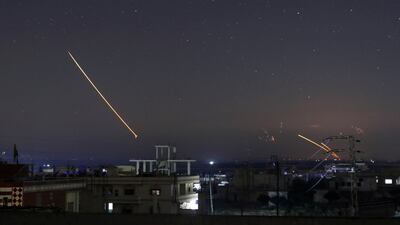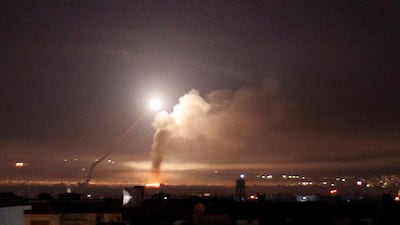Israel targeted “nearly all” Iranian installations in Syria early Thursday in response to rockets fired by Tehran’s forces at its military positions in the Golan Heights, risking a regional escalation that European leaders called a matter of “war and peace”.
The Iranian attack was the first ever carried out directly by the Islamic Republic against Israel, and came after US President Donald Trump pulled out of the nuclear agreement between Tehran and world powers.
The two countries are arch-enemies and have been engaged in a shadow war across the Middle East for years, most recently under the cloak of the Syrian conflict.
The strikes killed 23 Syrian regime and allied fighters, according to the Syrian Observatory for Human Rights (SOHR), a UK-based monitor. The Russian military said Israeli fired 70 missiles, with half of them downed.
"We hit nearly all the Iranian infrastructure in Syria," Israeli Defence Minister Avigdor Lieberman told a security conference.
"They need to remember the saying that if it rains on us, it'll storm on them. I hope we've finished this episode and everyone understood".
The latest trading of attacks has turned a regional crisis into a global issue.
European leaders called for calm as fears increased that the tit-for-tat could break into all-out war. French President Emmanuel Macron said there should be a “de-escalation”, as did Britain and Germany, who both condemned Iran’s attack.
"The escalation of the last hours show us that it's really about war and peace," said German Chancellor Angela Merkel.
A spokesperson for British Prime Minister Theresa May called on Iran to “refrain from any further attacks and for calm on all sides”.
After Mr Trump announced Washington’s withdrawal from the deal that sought to rein in Iran’s nuclear programme in return for the lifting of debilitating international sanctions, Israel put its troops on high alert and readied for an Iranian attack. It said it had spotted irregular movement by Tehran’s forces in Syria.
It launched an air strike south of Damascus that killed at least 15 people, including eight Iranians, SOHR reported.
________________
Read more
Israel strikes back after attacks on Golan blamed on Iranian forces in Syria
Fresh Israel missile attack reportedly targets Iran base in Syria
________________
Iran has established a significant presence in Syria after moving to support Syrian President Bashar Al Assad and maintain his power that had long been threatened by moderate rebels and extremist factions. It has deployed thousands of allied militiamen, its top military advisers from the Islamic Revolutionary Guard Corps (IRGC), advanced weaponry and armed drones, some in close proximity to the Golan Heights.
Israel captured the Golan Heights in the 1967 war, annexing it in 1981 in a move not recognized internationally. In 1974, Israel and Syria reached a cease-fire and a disengagement deal that froze the conflict lines with the plateau in Israeli hands.
Israel has said it will not allow Iran to develop an infrastructure on its shared borders with Syria or Lebanon.
"We're facing a new reality,” Mr Lieberman said. “The Iranian attempt to bring anti-aircraft systems to our borders and close our skies is intolerable and unacceptable”.
The Iranian military also props up the Lebanese Shiite militia group Hezbollah, which has also fought in support of Al Assad, placing an Iranian presence on two of Israel’s northern borders. Israel has carried out strikes on Iranian arms shipments to Hezbollah in Lebanon and Syria throughout the civil war.
Israel fears a multi-pronged assault by Iran’s proxies that has been bolstered by what the Islamic Republic calls the “axis resistance,” a corridor that runs from Iran, through Iraq and Syria, and into Lebanon.
Moscow has also served as arguably the most important backer of Al Assad, and the strikes came a day after Russian President Vladimir Putin hosted Israeli Prime Minister Benjamin Netanyahu in the Russian capital.
Mr Putin has expressed "deep concern" over US President Donald Trump's withdrawal from the Iran nuclear deal, a decision Netanyahu supported.
Mr Netanyahu told the Russian leader that "it is the right of every state, certainly the right of Israel, to take the necessary steps in order to protect itself from (Iranian aggression)", his office said in a statement Wednesday.
The biggest clash between the two countries in recent months came in February when Israel intercepted an Iranian drone that has breached its airspace from Syrian territory. Israel responded by deploying fighter jets but one crashed under anti-aircraft fire from Syrian territory in what was the first downing of an Israeli jet for decades.







